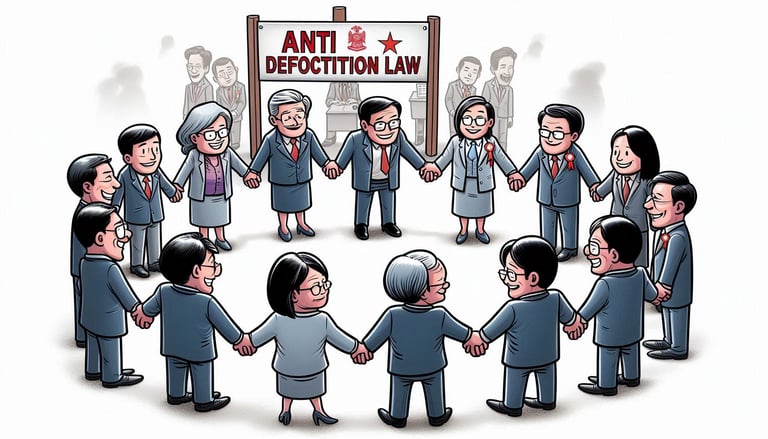Anti-Defection Law
Shubhi Singh
Chhatrapati Shahu Ji Maharaj University, Kanpur
This Blog is written by Shubhi Singh, a Fourth-Year Law Student of Chhatrapati Shahu Ji Maharaj University, Kanpur


Introduction
The Anti-Defection Law, enacted in India through the 52nd Amendment to the Constitution in 1985, aims to curb political defections and promote stability in governance. It lays down the procedures of disqualification of legislators on grounds of defection by the presiding officer, based on a petition by any member of the legislature. ‘Defection’ has been defined as, “To abandon a position or association, often to join an opposing group” The Advanced Law Lexicon defines defection as, “crossing the floor by a member of a Legislature is called defection.”
Key Provisions of the Anti-Defection Law
1. Disqualification
a) If a member of a house belonging to a political party:
· Voluntarily gives up the membership of his political party, or
· Votes, or does not vote in the legislature, contrary to the directions of his political party.
However, if the member has taken prior permission, or is condoned by the party within 15 days from such voting or abstention, the member shall not be disqualified.
b. If an independent candidate joins a political party after the election.
c. If a nominated member joins a party six months after he becomes a member of the legislature.
2. Power to Disqualify
· The Chairman or the Speaker of the House decides to disqualify a member.
· If a complaint is received concerning the defection of the Chairman or Speaker, a member of the House elected by that House shall take the decision.
3. Exception
Merger: A person shall not be disqualified if his original political party merges with another, and:
· He and other members of the old political party become members of the new political party, or
· He and other members do not accept the merger and opt to function as a separate group.
This exception shall operate only if not less than two-thirds of the members of the party in the House
have agreed to the merger
Advantages
· Provides stability to the government by preventing shifts of party allegiance.
· Ensures that candidates elected with party support and based on party manifestoes remain loyal to the party policies. Also promotes party discipline.
Disadvantages
· By preventing parliamentarians from changing parties, it reduces the accountability of the government to the Parliament and the people.
· Interferes with the member’s freedom of speech and expression by curbing dissent against party policies.
Some important Judgements and Rulings on the Tenth Schedule
· Kihota Hollohon vs. Zachilhu and Others AIR 1993 SC 412 The provisions do not subvert the democratic rights of elected members in Parliament and state legislatures. It does not violate their conscience. The provisions do not violate any right or freedom under Articles 105 and 194 of the Constitution.
· Ravi S Naik v. Union of India AIR 1994 SC 1558 The words “voluntarily giving up membership” have a wider meaning. An inference can also be drawn from the conduct of the member that he has voluntarily given up the membership of his party.
· G. Vishwanathan v. Speaker, Tamil Nadu Legislative Assembly (1996) 2 SCC 353 Once a member is expelled, he is treated as an ‘unattached’ member in the house. However, he continues to be a member of the old party as per the Tenth Schedule. So if he joins a new party after being expelled, he can be said to have voluntarily given up membership of his old party.
· Dr. Kashinath G Jhalmi v. Speaker, Goa Legislative Assembly (1993) 2 SCC 703 The Speaker of a House does not have the power to review his own decisions to disqualify a candidate. Such power is not provided for under the Schedule and is not implicit in the provisions either.
· Rajendra Singh Rana and Ors. vs. Swami Prasad Maurya and Ors. (2007) 4 SCC 270 If the Speaker fails to act on a complaint, or accepts claims of splits or mergers without making a finding, he fails to act as per the Tenth Schedule. The Court said that ignoring a petition for disqualification is not merely an irregularity but a violation of constitutional duties.
Conclusion
The Anti-Defection Law plays a crucial role in maintaining the integrity of India's political landscape. While it has its shortcomings, the law is essential for promoting stability and accountability in governance. Ongoing discussions about its reform and implementation continue to shape its future relevance in Indian politics, reflecting the dynamic nature of democracy itself.
References
· Breaking down the 10th Schedule of the Indian Constitution - iPleaders
· Anti-Defection Law in India: Contours and Concerns - Issuu
· Schedule X of our Indian Constitution-a myth or a reality? (legalservicesindia.com)
